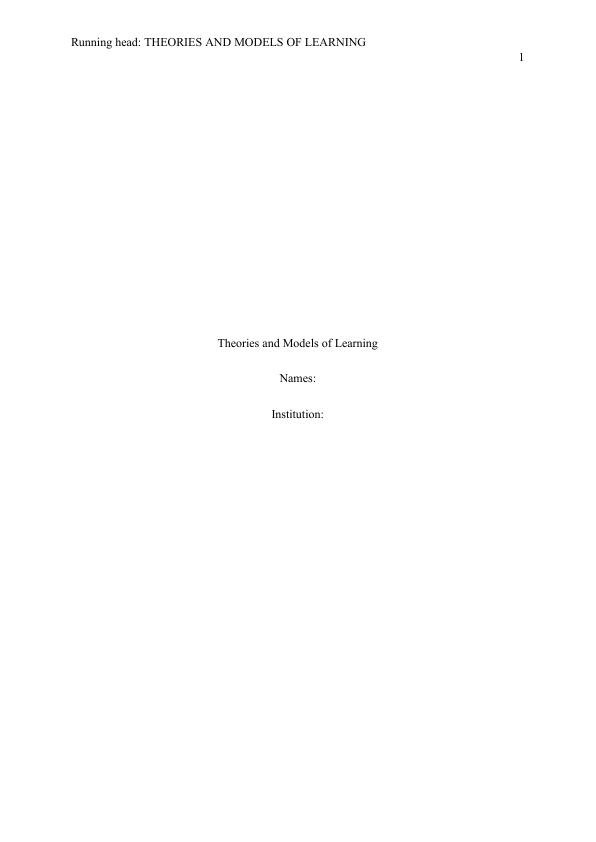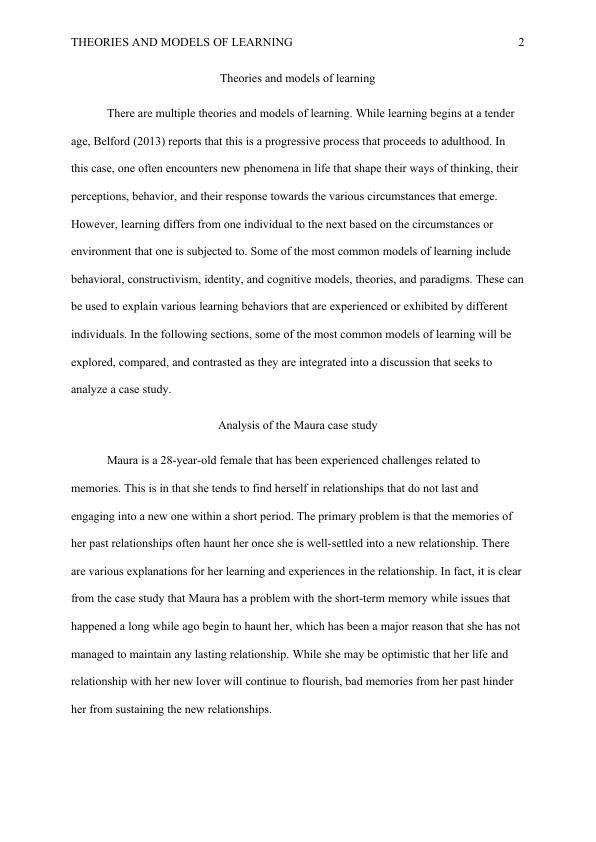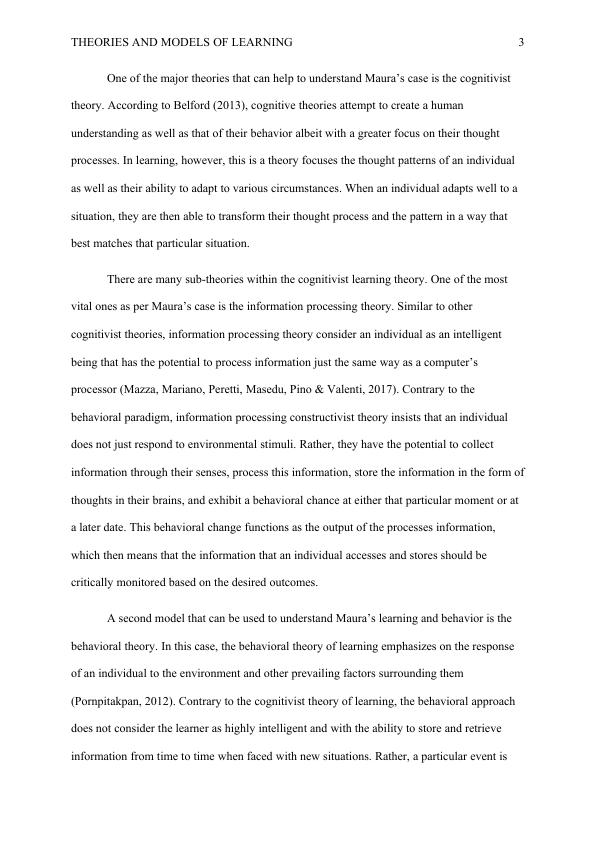Theories and Models of Learning PDF
8 Pages2023 Words241 Views
Added on 2022-01-25
Theories and Models of Learning PDF
Added on 2022-01-25
ShareRelated Documents
Running head: THEORIES AND MODELS OF LEARNING
1
Theories and Models of Learning
Names:
Institution:
1
Theories and Models of Learning
Names:
Institution:

THEORIES AND MODELS OF LEARNING 2
Theories and models of learning
There are multiple theories and models of learning. While learning begins at a tender
age, Belford (2013) reports that this is a progressive process that proceeds to adulthood. In
this case, one often encounters new phenomena in life that shape their ways of thinking, their
perceptions, behavior, and their response towards the various circumstances that emerge.
However, learning differs from one individual to the next based on the circumstances or
environment that one is subjected to. Some of the most common models of learning include
behavioral, constructivism, identity, and cognitive models, theories, and paradigms. These can
be used to explain various learning behaviors that are experienced or exhibited by different
individuals. In the following sections, some of the most common models of learning will be
explored, compared, and contrasted as they are integrated into a discussion that seeks to
analyze a case study.
Analysis of the Maura case study
Maura is a 28-year-old female that has been experienced challenges related to
memories. This is in that she tends to find herself in relationships that do not last and
engaging into a new one within a short period. The primary problem is that the memories of
her past relationships often haunt her once she is well-settled into a new relationship. There
are various explanations for her learning and experiences in the relationship. In fact, it is clear
from the case study that Maura has a problem with the short-term memory while issues that
happened a long while ago begin to haunt her, which has been a major reason that she has not
managed to maintain any lasting relationship. While she may be optimistic that her life and
relationship with her new lover will continue to flourish, bad memories from her past hinder
her from sustaining the new relationships.
Theories and models of learning
There are multiple theories and models of learning. While learning begins at a tender
age, Belford (2013) reports that this is a progressive process that proceeds to adulthood. In
this case, one often encounters new phenomena in life that shape their ways of thinking, their
perceptions, behavior, and their response towards the various circumstances that emerge.
However, learning differs from one individual to the next based on the circumstances or
environment that one is subjected to. Some of the most common models of learning include
behavioral, constructivism, identity, and cognitive models, theories, and paradigms. These can
be used to explain various learning behaviors that are experienced or exhibited by different
individuals. In the following sections, some of the most common models of learning will be
explored, compared, and contrasted as they are integrated into a discussion that seeks to
analyze a case study.
Analysis of the Maura case study
Maura is a 28-year-old female that has been experienced challenges related to
memories. This is in that she tends to find herself in relationships that do not last and
engaging into a new one within a short period. The primary problem is that the memories of
her past relationships often haunt her once she is well-settled into a new relationship. There
are various explanations for her learning and experiences in the relationship. In fact, it is clear
from the case study that Maura has a problem with the short-term memory while issues that
happened a long while ago begin to haunt her, which has been a major reason that she has not
managed to maintain any lasting relationship. While she may be optimistic that her life and
relationship with her new lover will continue to flourish, bad memories from her past hinder
her from sustaining the new relationships.

THEORIES AND MODELS OF LEARNING 3
One of the major theories that can help to understand Maura’s case is the cognitivist
theory. According to Belford (2013), cognitive theories attempt to create a human
understanding as well as that of their behavior albeit with a greater focus on their thought
processes. In learning, however, this is a theory focuses the thought patterns of an individual
as well as their ability to adapt to various circumstances. When an individual adapts well to a
situation, they are then able to transform their thought process and the pattern in a way that
best matches that particular situation.
There are many sub-theories within the cognitivist learning theory. One of the most
vital ones as per Maura’s case is the information processing theory. Similar to other
cognitivist theories, information processing theory consider an individual as an intelligent
being that has the potential to process information just the same way as a computer’s
processor (Mazza, Mariano, Peretti, Masedu, Pino & Valenti, 2017). Contrary to the
behavioral paradigm, information processing constructivist theory insists that an individual
does not just respond to environmental stimuli. Rather, they have the potential to collect
information through their senses, process this information, store the information in the form of
thoughts in their brains, and exhibit a behavioral chance at either that particular moment or at
a later date. This behavioral change functions as the output of the processes information,
which then means that the information that an individual accesses and stores should be
critically monitored based on the desired outcomes.
A second model that can be used to understand Maura’s learning and behavior is the
behavioral theory. In this case, the behavioral theory of learning emphasizes on the response
of an individual to the environment and other prevailing factors surrounding them
(Pornpitakpan, 2012). Contrary to the cognitivist theory of learning, the behavioral approach
does not consider the learner as highly intelligent and with the ability to store and retrieve
information from time to time when faced with new situations. Rather, a particular event is
One of the major theories that can help to understand Maura’s case is the cognitivist
theory. According to Belford (2013), cognitive theories attempt to create a human
understanding as well as that of their behavior albeit with a greater focus on their thought
processes. In learning, however, this is a theory focuses the thought patterns of an individual
as well as their ability to adapt to various circumstances. When an individual adapts well to a
situation, they are then able to transform their thought process and the pattern in a way that
best matches that particular situation.
There are many sub-theories within the cognitivist learning theory. One of the most
vital ones as per Maura’s case is the information processing theory. Similar to other
cognitivist theories, information processing theory consider an individual as an intelligent
being that has the potential to process information just the same way as a computer’s
processor (Mazza, Mariano, Peretti, Masedu, Pino & Valenti, 2017). Contrary to the
behavioral paradigm, information processing constructivist theory insists that an individual
does not just respond to environmental stimuli. Rather, they have the potential to collect
information through their senses, process this information, store the information in the form of
thoughts in their brains, and exhibit a behavioral chance at either that particular moment or at
a later date. This behavioral change functions as the output of the processes information,
which then means that the information that an individual accesses and stores should be
critically monitored based on the desired outcomes.
A second model that can be used to understand Maura’s learning and behavior is the
behavioral theory. In this case, the behavioral theory of learning emphasizes on the response
of an individual to the environment and other prevailing factors surrounding them
(Pornpitakpan, 2012). Contrary to the cognitivist theory of learning, the behavioral approach
does not consider the learner as highly intelligent and with the ability to store and retrieve
information from time to time when faced with new situations. Rather, a particular event is

End of preview
Want to access all the pages? Upload your documents or become a member.
Related Documents
(PDF) Approaches to Working with Children and Familieslg...
|7
|1492
|55
Cognitive Behavioral Therapy For Anxietylg...
|8
|1840
|21
Psychology Assignment | Psychological Theorieslg...
|9
|2137
|369
Cognitive Behavioral Therapy: Assumptions, Goals, and Techniqueslg...
|5
|1447
|381
Theoretical Perspectives of Learninglg...
|4
|804
|93
Assignment on Learning Theorieslg...
|7
|1390
|27
